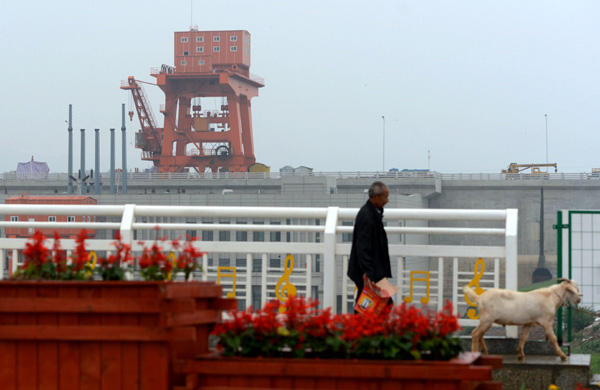Major water project free from pollution
 0 Comment(s)
0 Comment(s) Print
Print E-mail China Daily, September 23, 2014
E-mail China Daily, September 23, 2014
Conservation still a priority for capital
With the central route of the South-to-North Water Diversion Project about to bring 9.5 billion cubic meters of water each year to benefit Beijing and the dry north, authorities said conserving water and enhancing water efficiency are still a priority for the north.
He Fengci, deputy director of the Beijing office of the South-to-North Water Diversion Project, said that although Beijing will receive more than 1 billion cubic meters of diverted water every year, the capital's water scarcity cannot be alleviated long-term because of the surging water demand that comes with rapid economic development.
 |
|
A view of the water gate at Danjiangkou Reservoir, which was raised nearly 15 meters in height to divert water to North China. [Photo/China Daily] |
"Every drop of water is precious," He said, adding that no matter how much water can be diverted to the capital, saving water and raising water efficiency cannot be neglected.
The annual per capita water consumption in Beijing is about 100 cubic meters, equaling about 10 percent of the international warning line for water shortage of 1,000 cubic meters, according to the office.
According to the Beijing Water Authority, water resources have reduced dramatically due to a continuous drought since 1999, decreasing the annual water flow into Miyun Reservoir to 270 million cubic meters on average over the past 13 years, about 72 percent less than the average annual volume before 1999.
While water resources have declined in the capital, the population grew from 12.6 million in 1999 to 21.1 million in 2013, according to the Beijing Bureau of Statistics.
Li Yuanyuan, vice president of the Institute of Water Resources and Hydropower Planning, said rapid economic development and urbanization bring surging demand for water.
Domestic water consumption in Beijing increased steadily by 50 million cubic meters annually in recent years, according to the Beijing Water Authority.
He said conserving water is the solution for sustainable economic development and the water project can help meet the surge in water demand.
Zhang Xiaojian, a professor of environmental protection at Tsinghua University, said water from the central route will help the capital protect the environment and restore groundwater, which has been excessively pumped in past years.
He added that groundwater pumping will gradually be reduced by closing self-supply wells after full and steady operation of the central route.
More than 50 percent of the water will be used for domestic and industrial use, covering water consumption over 6,000 square kilometers, according to the Beijing Office of the SNWD project.
Part of the diverted water will be stored in three reservoirs as strategic water resources for emergency, He said.
Although the water quality is guaranteed, surveys conducted by a laboratory in Danjiangkou Reservoir showed some residents in Beijing may notice that their tap water has become a little yellowish because the central route's water is different in terms of such as pH level, causing corrosion of old iron pipes.
Beijing Waterworks Group authorities said efforts have been made to improve the pipeline network to reduce such possibilities and emergency plans drawn up to deal with such incidents.
Workers share environmental ethic
Major water project free from pollutionLi Jinqun lost an arm in an industrial accident, but his daily routine has remained largely unchanged for years. At 7 am, he leaves his house in Taocha, a village in Xichuan county, Henan province, to help clean the Taocha canal, the starting point of the South-to-North Water Diversion Project's central route.
Li, 66, has witnessed the construction of the project over the past 44 years and said he is glad to see it finally reaching completion.
He joined the project back in 1970 and lost his right arm that May in a construction site accident. He was determined to make a contribution and insisted on working after he recovered.
"Even if my physical capacity is limited, it is important to maintain the environment and provide clean water to provinces that badly need it," Li said.



